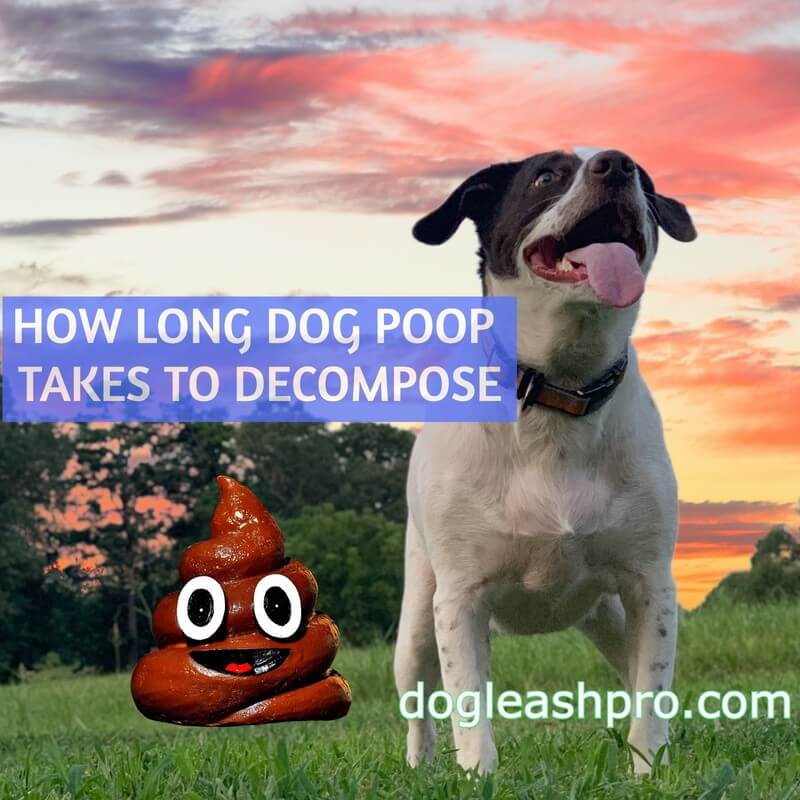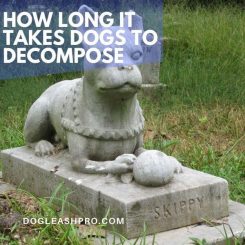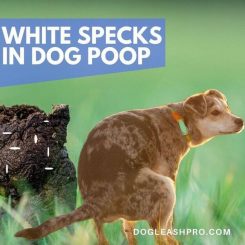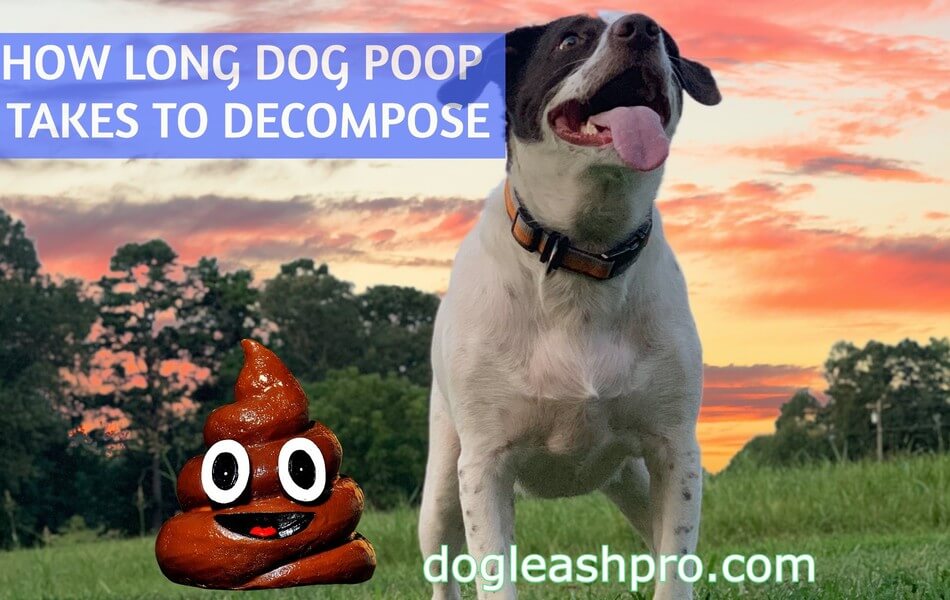
My yellow Labrador has free rein in our backyard and with the help of a wireless dog fence, she will spend all day there. She has a habit of pooping there at night. I’ll remove her poop, but when I’m lazy, I often wondered what would happen to the dog poop if I didn’t remove it. I finally looked into it and am happy to share with you about dog poop decomposition if you’re wondering the same.
How long does it take for dog poop to decompose? On average, dog poop takes about nine weeks to decompose. However, this depends on several factors, like the dog’s diet, size of the stool, and climate. In warm conditions, dog poop starts decomposing within a week but takes about nine weeks to disintegrate fully. During winter, dog poop decomposition slows down and can last for up to 12 months in cold weather.
Table of Contents
How long does it take for dog poop to decompose?
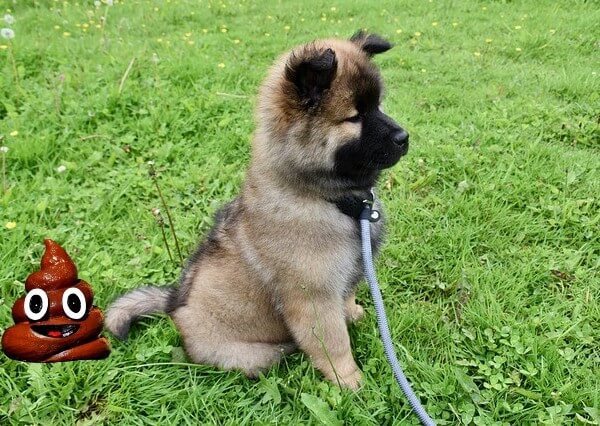
Dog poop takes about nine weeks to decompose. It depends on several factors such as:
- Size (small or large stool)
- Climate (cold or warm)
- Dog’s diet (meat-based, plant-based, or both)
In warmer and humid climates, dog poop starts decomposing within 1 week. However, the poop takes around nine full weeks to disintegrate fully. Heat and humidity help nurture the bacteria that aid decomposition, and the process goes faster.
In colder climates, dog poop decomposition slows down — sometimes stops. Just like how food lasts longer in a fridge, poop decomposes slowly if it is cold outside. And if it is snowing, the poop decomposition stops altogether — like food in a freezer. Doggy poop can last for up to 12 months in cold weather.
Did You Know? Your dog is smarter than you think! Did you know that dogs instinctively use the Earth’s magnetic field to help align their spine in a north-south position before they poop? Well, now you know!
Diet affecting dog poop
What goes in the dog affects what comes out of it. A meat-only diet produces waste that takes longer to decompose and is generally smellier.
In contrast, dog poop from a high-grain or plant-based diet decomposes much faster and smells less. Dogs that eat kibble, dry food made of plant, grain, and meat, drop stools with properties between meat-based and plant-based diets.
How long does dog poop take to decompose, break down, and biodegrade?
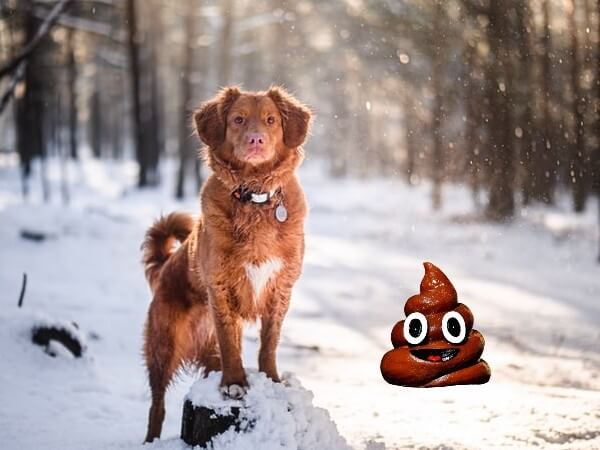
Whether it is dog poop or puppy diarrhea, both are organic substances, so they are indeed biodegradable. On average, dog poop takes about nine weeks to break down and disappear. However, that doesn’t mean the pathogens and bacteria inside it disappear too. As dog poop rots, harmful pathogens spread through the soil, water, and wind.
The decomposition process starts after about a week and goes on for another eight weeks. If the weather is cold, the decomposition is very slow. And in snowy conditions, no breakdown takes place. Dog excrement can last for up to a year if the weather is cold.
Does dog poop decompose
After 7 days
Dog’s poop remains more or less the same after a week. It is also teeming with harmful bacteria and parasites. However, you can still keep most of these microbes from becoming a menace to the environment if you dispose of the poop at this point.
Weeks 2 to 3
The poop color starts getting darker, and the decomposition begins. During this stage, the harmful pathogens in the feces pose a severe threat to passersby. Over 23 million fecal bacteria per gram of dog poop are ready to infect any animal and humans that come in contact. If the climate is warm and humid, mold will start to appear on the outside.
The bacteria in the dog poop can contaminate the waterways during rainy days and can even make humans sick if they come into contact with the poop in any way.
You may be interested in: My Dog Has Diarrhea But Is Acting Fine
Week 4
The warm and damp environment inside the feces has been nurturing parasite eggs. At this stage, the larvae begin hatching. These parasitic larvae latch on to feet, shoes, and anything nearby and travel all over your house. Once they find a suitable host, the larvae will mature into adults and produce thousands of offspring.
Week 5
During the 5th week, the feces start polluting the environment. The microbes in the dog excrement start getting absorbed into the soil beneath. Rain and water runoff carry these microbes into water reserves, where they flourish and multiply.
The bacteria can also spread by wind and pose a threat to the health of your family and neighbors.
Weeks 6 to 7
White mold covers the poop and starts releasing massive amounts of spores. These fungal spores can cause allergies and breathing issues. Although the mold isn’t hazardous for humans, they can still experience watery eyes, runny noses, and trouble breathing after inhaling the spores.
Weeks 7 to 8
The poop itself has shrunk considerably after losing its water over time and isn’t as dangerous as it was a while ago. Disposing the poop at this point wouldn’t make much of a difference, as the damage is already done. The bacteria, parasites, and fungi have likely spread to the area surrounding the poop, and your yard is at risk of becoming completely contaminated.
Week 9 (Final)
The poop has turned to dust, and all that’s left is a shadow. The dense fecal matter had been blocking the sunlight, which is why any grass underneath the poop will not survive. While you can’t see it, countless bacteria and parasitic eggs are still there, so you still need to be careful.
How to dispose of dog poop correctly
1. Used plastic bags
Although it’s not the best way to dispose of your dog’s waste, it is convenient. You get to reuse your old grocery bags, and the feces travel safely to the landfill without contaminating anything else.
2. Biodegradable bags
Biodegradable bags are a better option than regular plastic bags. They disintegrate after a few days, allowing the fecal matter to become a part of the landfill environment.
Do note that oxo-biodegradable bags break down instead of fully decomposing and contribute to plastic pollution on a micro-level.
3. Compostable bags
To go even greener, you can use compostable bags made of organic matter. Since they’re made without any plastic derivatives, they don’t contribute to polluting the environment in any way.
Compostable bags are designed to decompose at a specific temperature, usually reached in compost piles.
4. Flushable bags
These degradable bags dissolve when coming into contact with water. They’re called flushable bags, and you can flush them with your dog’s poop down your toilet.
Flushable toilet bags still pose a clogging risk if the plumbing isn’t adequate. It is also not recommended to throw these bags in the trash, as they may leak after contacting any liquid.
5. Flushing
Flushing is the most environmentally friendly way to dispose of dog waste. The poop doesn’t contaminate the environment, as the sewage water is sterilized in a treatment plant before being dumped.
Make sure to flush the poop and not the bag—even if it is biodegradable. Any kind of bag poses a clogging risk.
6. Waste collection service
This is a convenient option if you live in a neighborhood with lots of pet dogs. You just have to drop your dog’s waste in dedicated bins near your house, and a private waste removal service will empty them for you.
The waste collectors dispose of the doggy poop in an environmentally friendly way. You can share the cost of this service with other pet owners in the area, making it economical for all.
7. Digester
A digester is an effective way to neutralize the pollutants in your dog’s stool. It consists of a container with holes that you bury in your lawn. Put the dog poop in, add enzyme and water, and the digester will turn it into a sterilized liquid to be absorbed by the soil.
8. Composting
Another use for pet excrement is to turn it into compost. You can either do it in a compost pile in your backyard or send the poop to a composting facility. Note that the manure produced won’t be suitable for growing fruits or vegetables. Nevertheless, you can still use it for pots, flowers, and ornamental plants.
Any of these method will allow you to properly dispose of your dog’s poop. Since dog poop can cause parasite infection, it’s best to dispose of your dog’s feces immediately. This will help prevent you and your pooch from stepping on the poop the next time he needs to do his business.
Dogs don’t wash their paws and if they come inside the house with dirty paws, it can affect other pets and people in the house. Immediate removal of your dog’s poop can also protect you and your dogs from parvo, coccidia, giardia, whipworms, trichinosis, hookworms, and roundworms.
How to get rid of dog poop in the yard without scooping

If scooping up dog poop feels like a hassle, there are ways to make it go away without getting your hands dirty.
Agricultural lime removes the bacteria and removes moisture from your dog’s feces
Agricultural lime is made with powdered limestone and is available at any gardening store. This powder removes the bacteria and removes moisture from the feces, neutralizing the smell and aiding poop breakdown.
However, lime is highly reactive and requires utmost care to prevent injury. If used excessively, it can destroy your yard’s soil too.
Commercially available enzymes is a safer alternative to get rid of dog poop in your yard
Commercially available enzymes or dissolvers are curated to remove all sorts of doggy waste in a short time. These chemicals are much safer than lime and are scented to eliminate the odor. You can use it in your yard without harming yourself, your dog, or your plants.
Soda bicarbonate and peppermint essential oil can accelerate dog poop decomposition
A DIY option involves soda bicarbonate and peppermint essential oil. This method also accelerates stool decomposition by desiccating the feces and destroying the smelly bacteria.
Add a few drops of peppermint oil to a bowl full of sodium bicarbonate powder, sprinkle it generously on the dog poop, and it will disappear after some time. However, this method is not as efficient as commercially available alternatives.
Is dog poop good fertilizer?
No, dog poop is not a good fertilizer. In fact, dog poop is not meant to be a fertilizer. Dog poop is actually not good for your grass at all. While cattle or horse dung make good-quality fertilizers because they mainly have a plant-based diet, dog poop can damage your greens.
Even if you successfully disinfect and compost doggy poo, it won’t be fit for growing any edible plants. Manure made with dog poop is best used for ornamental plants and as gardening mulch.
Why is dog poop not a good fertilizer?
The canine diet is mainly protein-based so most of it comes from meats. Most of the dog food we buy from the store includes one of these three meat types: chicken, beef, or pork products. This meaty diet makes the dog’s feces very acidic and nitrogen-heavy. Using this acidic and nitrogen-rich poop to fertilize plants will burn them.
Is dog poop biodegradable?
Yes, dog poop is biodegradable. But as the fecal matter decomposes, the harmful pathogens get released into the environment. These pathogens pollute the water, spread diseases, and disturb the local ecosystem.
How to speed up decomposition of dog poop?
On average, dog droppings take up to 9 weeks to decompose completely. But you can reduce this time by using chemical methods.
- Agricultural lime can break the poop down in just 2 to 6 days, leaving no residue. However, it can burn your skin and injure your dog upon contact.
- High-quality commercial poop dissolvers start working in a matter of hours and make the stool disappear completely in 2 to 3 days. They can be used on all surfaces and clean urine as well as poop.
- Peppermint essential oil and sodium bicarbonate mixture is a homemade solution to help doggy poop dissolve quicker. This is in case you don’t have commercial poop dissolvers available.
Conclusion
Considering how dangerous dog poop can be for the environment, dog owners should never leave their pup’s droppings out in the open. Always carry a poop bag when you go out for walks, never use dog poop as soil, potty-train your canine friends to do their business in designated spots, and discard the poo responsibly.
Related Questions
Dog poop takes nine weeks on average to break down entirely. However, the duration varies depending on the dog’s diet and the surrounding temperature.
Treating dog feces with certain chemicals can accelerate its decomposition. For example, agricultural lime and some DIY and commercially available enzymes can make dog poop degrade faster.
No, it is not ok to bury dog poop in your backyard. Burying dog poop allows harmful pathogens to breed and contaminate the environment. Always dispose of your dog’s feces responsibly.
It takes about a year for dog poop to decompose in winter. Cold temperature preserves dog poop by slowing down the natural decomposition process.
A regular plastic bag may not decompose for several hundred years.
Biodegradable poop bags are designed to disintegrate after 3 to 6 months.
Some poop bags are designed to decompose under certain conditions. For example, compostable bags decompose at temperatures found in compost piles, and flushable bags disintegrate when they get wet.
It takes around 6 to 8 weeks for dog poop to decompose in soil. In soil, dog poop decomposes slightly faster due to higher temperatures.
Poop can continue to smell as long as it doesn’t fully decompose. If you want it gone, remove the feces and treat the area with a detergent, commercial cleaner, or vinegar solution.
It takes about six weeks for dog poop to turn white. Dog poop turns completely white because of a fungal mold.
Resources:
https://www.baltimoresun.com/maryland/carroll/cctnews-the-scoop-on-dog-poop-20150414-column.html
https://www.livescience.com/44732-eliminating-pet-poop-pollution.html

With over five years of specialized experience as an animal writer, my expertise lies in dog nutrition, health, behavior, grooming, and training. I am dedicated to delivering helpful and informative content that caters to the well-being of our furry friends. My primary goal is to empower pet owners with knowledge and ensure our canine companions thrive in health and happiness. In my free time, I love volunteering at local dog rescue centers.
